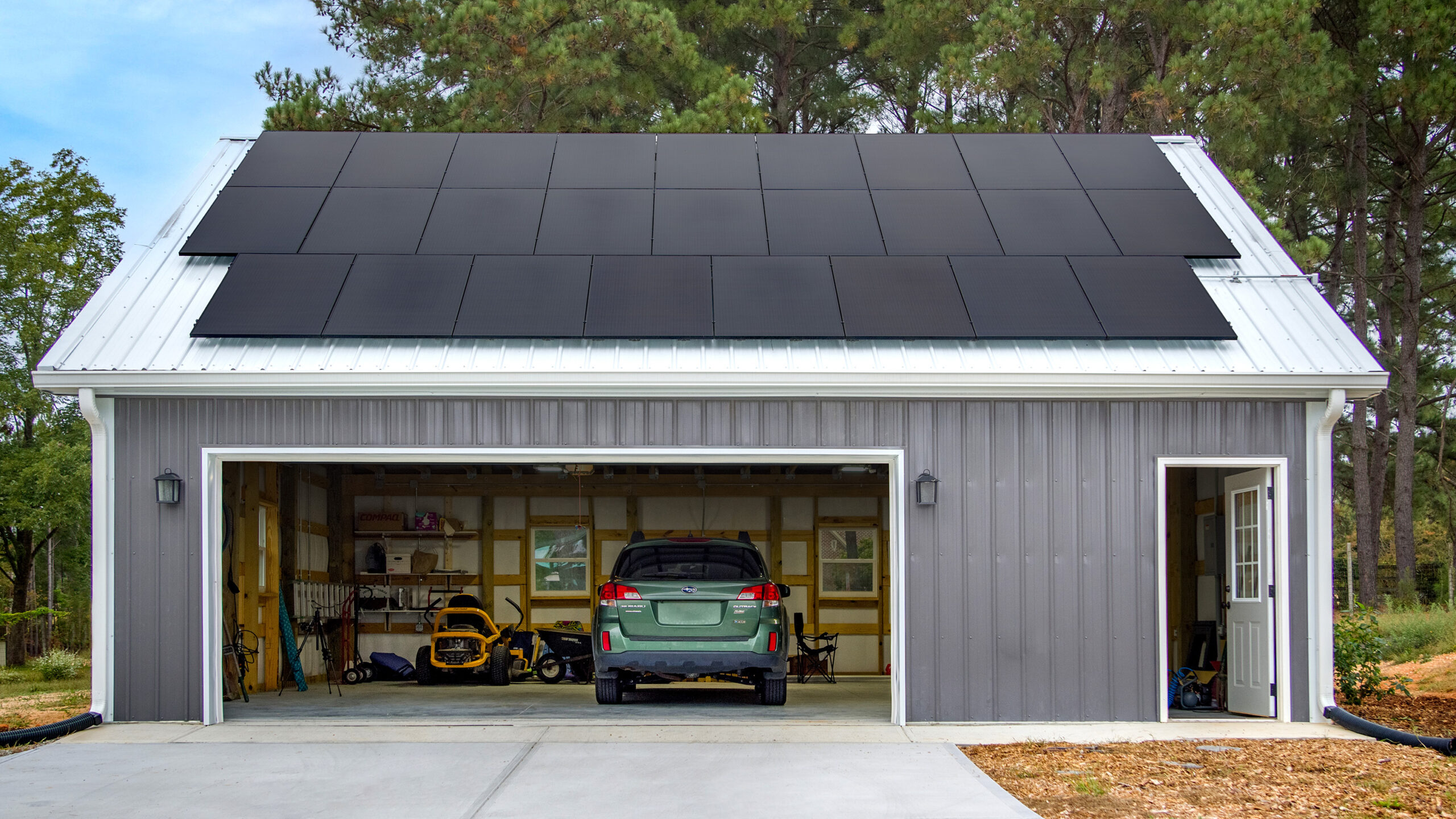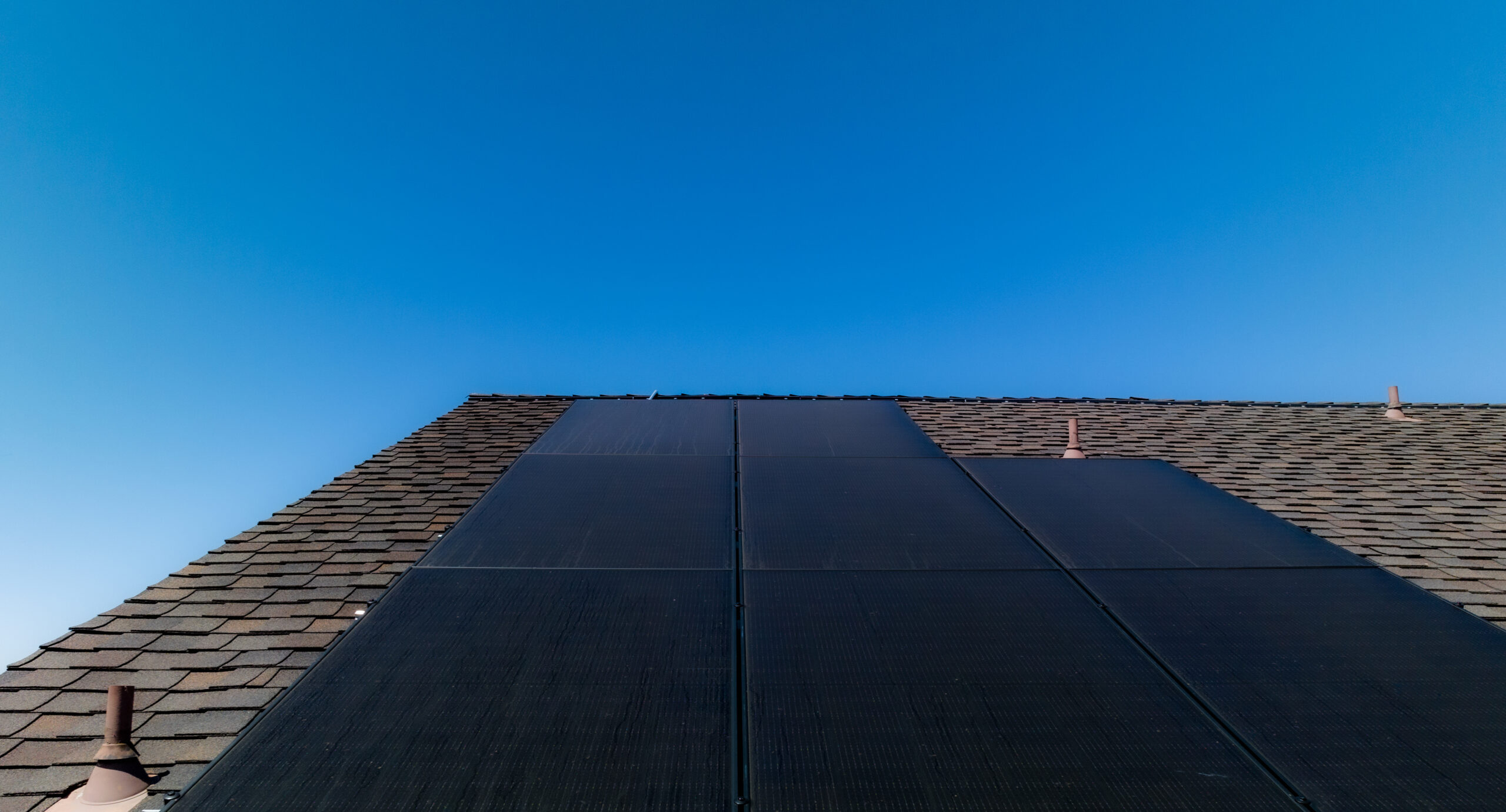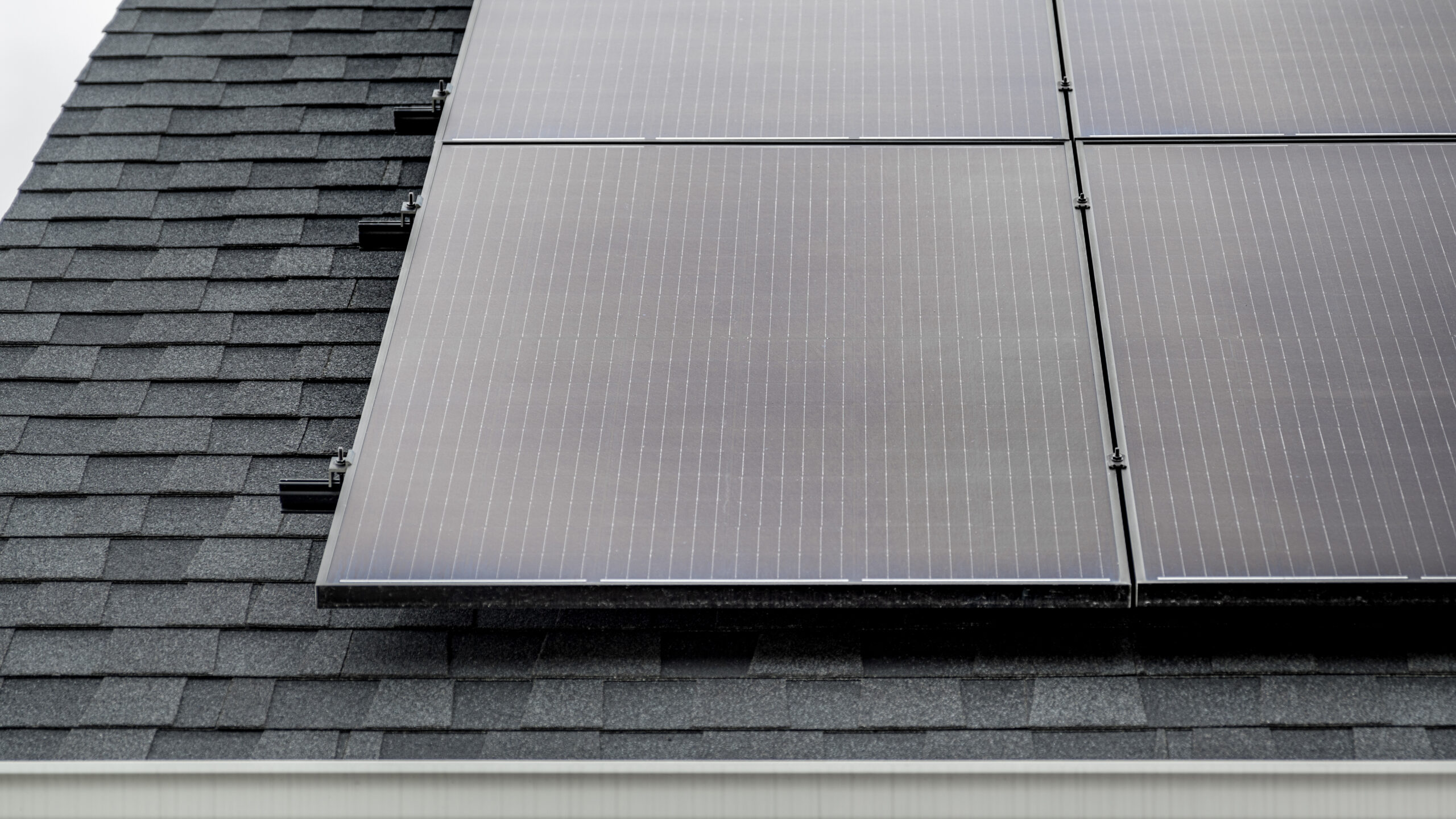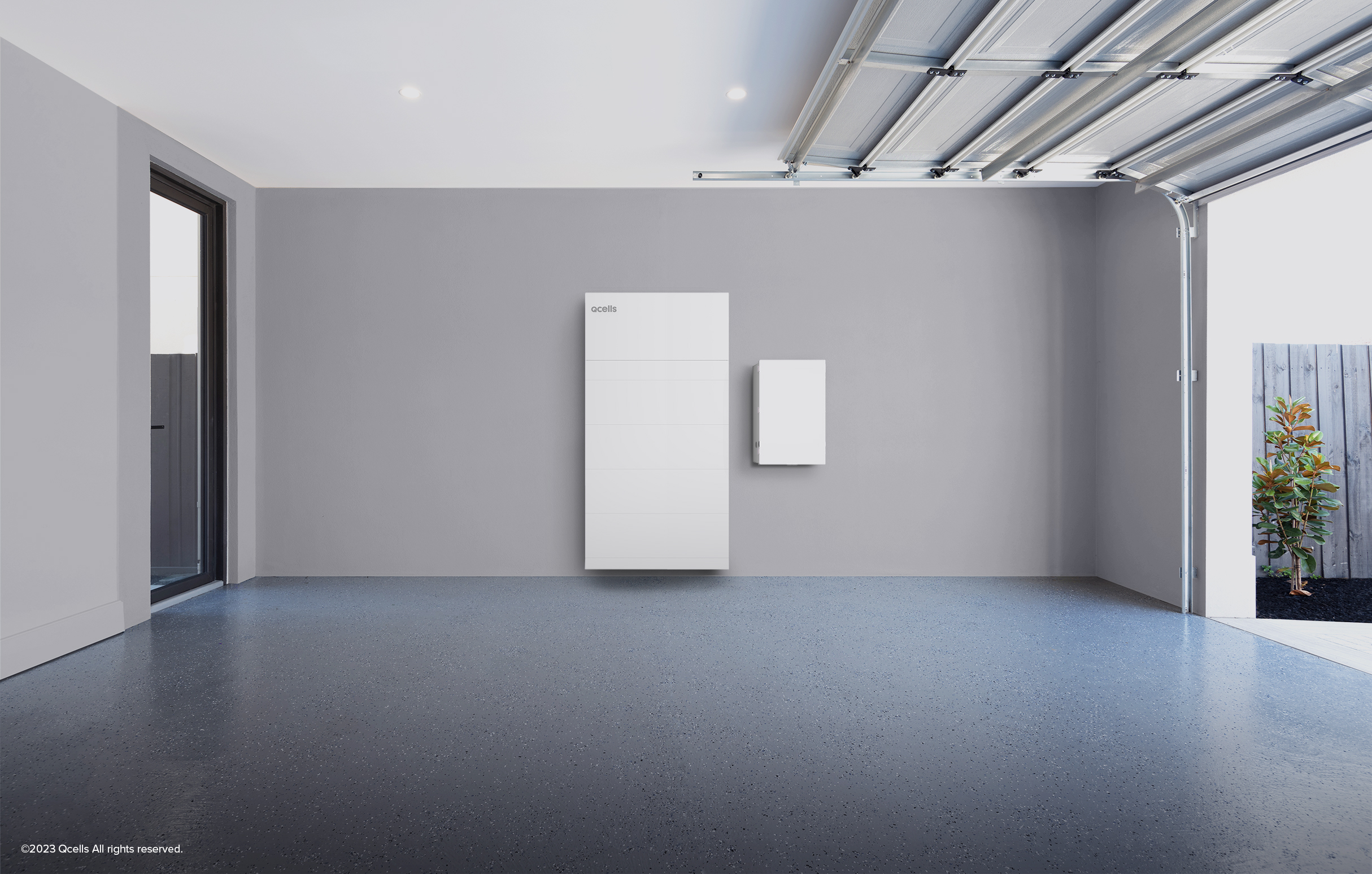As the world continues to embrace and adopt solar energy, many homeowners are deciding to switch to home solar systems. Installing a home solar system offers numerous benefits, including energy independence, reduced electricity bills, and increased home value. However, many people who are new to solar often don’t know about these advantages.
In this beginner’s guide to home solar systems, Qcells covers the basics of a system, the overall benefits of solar energy, different system types, the installation process, and more. Read on to discover everything you should know before going solar.
What Is a Home Solar System?
A home solar system, also known as residential solar, is a system that converts sunlight into usable energy for residential properties. It comprises solar panels, inverter(s), and a battery (optional) and is also connected to the main power grid.
Solar panels are the heart of a home solar system and function by absorbing available sunlight. The panels are made up of photovoltaic (PV) cells, which capture the sunlight and convert it into direct current (DC) electricity. The DC then moves through the inverter, where it is converted to alternating current (AC) electricity necessary for powering homes and appliances.
Benefits of Home Solar Systems
Solar power systems for homes have become more affordable in recent years, making them more accessible and popular for homeowners everywhere. As people consider switching to solar energy, they want to know the benefits of solar panels and why they are a better option than regular grid energy. Let’s look at the advantages of solar energy to see if they are a good fit for you.
1. Solar Panels Are Increasingly Affordable
The cost of manufacturing and installing solar panels has significantly decreased in recent years thanks to advances in solar technology and increased production and manufacturing capacity. Additionally, as states across the country realize the benefits of solar panels, they have introduced various financial programs to help offset the cost of solar operation and installation.
2. You Can Save Money by Going Solar
One of the biggest draws of home solar systems is the potential for long-term cost savings. As homeowners produce their own energy to power their homes, they reduce their reliance on local grid electricity. And the less they use the grid, the lower their utility bills could be. Over time, the money saved on electricity bills could add up to substantial financial benefits.
3. Keep the Lights on When the Grid Goes Down
Electricity grids can experience power outages for several reasons, including extreme temperatures, weather-related emergencies, and even user overload from too many consumers using the grid during peak hours. A home solar system with an added backup battery can keep the lights on, even when the grid goes down.
When solar panels generate more energy than a homeowner can use, that extra energy has to go somewhere. With backup batteries, the excess electricity is stored for later use, meaning homeowners can keep their lights and appliances on when others are dealing with a power outage.
4. Solar Can Increase Your Home Value
Another advantage of solar power is that it can increase the value of a home. Houses with home solar systems installed tend to sell faster and at a higher price than comparable homes without solar. Many prospective buyers appreciate the environmental and financial benefits of solar energy and consider homes with solar panels as more attractive in the real estate market.
5. Solar Panels Work in Different Climates
Some people believe solar panels are only effective in excessively sunny climates. However, solar panels can generate energy in a range of different weather conditions, including cloudy, rainy, or snowy days.
Solar panels are still the most efficient in areas with abundant sunshine, but technological advances have made solar panels more effective at capturing and converting sunlight (i.e., daylight) into usable energy. These advances have made home solar systems suitable for various climates.
Types of Home Solar Systems
When deciding to switch to a solar power system for a home, there are three types of systems homeowners can choose from: grid-tied, off-grid, and hybrid. Let’s look at how each one works.
Grid-Tied
Grid-tied systems are the most common type of home solar system. They are connected to the local power grid and allow homeowners to use any solar energy they produce while using the grid’s electricity as needed. A grid-tied system also lets homeowners take advantage of net metering programs. These programs, where available, let solar users sell excess generated energy back to the grid in exchange for credits back on their utility bills.
Off-Grid
An off-grid system isn’t connected to the utility grid and is operated independently from it. These systems are designed to work in areas where it’s not possible or preferable to connect to local electricity, like at campgrounds, cabins, or remote small towns. For off-grid systems to work, they need a solar battery to store excess energy that can be used at night or during other periods of low sunlight.
Hybrid
Hybrid solar systems combine features from both grid-tied and off-grid systems. A hybrid system is connected to the grid but also uses a backup battery for when the grid is unavailable. Many people prefer hybrid home solar systems because they get the flexibility of a grid-tied system while still enjoying some of the energy independence provided by off-grid systems.
Solar Incentives and Tax Credits
Local, state, and federal governments offer various rebates, incentives, and tax credits to help reduce the cost of installing home solar systems. These programs are meant to encourage homeowners to adopt solar energy, though not all of them are available everywhere. These are two of the most popular programs.
- Federal Solar Tax Credit — This program allows homeowners to claim 30% of their solar installation costs on their federal income taxes. The solar tax credit is only available for one-time use and can only be applied to the taxes for the year the system was installed.
- Net Metering — Some state and local governments work with utility companies to offer solar net metering programs. This allows homeowners with grid-tied systems to send or “sell” back unused energy to the electrical grid. In exchange for this extra energy, the utility company gives the homeowner credit toward their electricity bill to help bring the cost down.
Homeowners interested in these programs should research what is available in their area when deciding to go solar. It’s important to remember that some of these programs have a strict end date, so homeowners should switch to solar before the programs end to ensure they can take advantage of them.
What Should I Consider When Choosing Solar Panels?
There are several options for solar panels in the industry today, though not all of them are created equal. Here are a few things to consider when choosing solar panels.
Cost
Solar installation costs will vary based on location, number of solar panels needed, and even the solar company used. Interested homeowners should get several solar quotes that cover installation and equipment before making a final decision. Taking this approach is the best way to find a good balance between cost-effectiveness and high-quality solar panels.
Warranty
Most solar panels come with manufacturer warranties that are good for 20-25 years. However, not all warranties will offer the same coverage. Homeowners should look for a warranty that covers both performance issues and manufacturing defects to ensure they are covered in most situations.
Efficiency
Solar panel efficiency is measured by how much sunlight a panel can convert into usable electricity. This means that higher-efficiency panels, like those from Qcells, generate more energy per square foot compared to solar panels with a lower efficiency rating. Homeowners can work with a home solar installation company to choose the right solar panels to optimize energy production for their homes.
How Many Solar Panels Do I Need for My Home?
There are a few different factors that determine how many solar panels a home needs, including energy consumption, available roof space, and how efficient the panels are. Here are a few rough estimates based on average home size.
- 1,500 sq. ft. — 18-24 solar panels
- 2,000 sq. ft. — 24-32 solar panels
- 2,500 sq. ft. — 30-40 solar panels
It’s important to remember that these numbers are just general averages and will vary based on the factors mentioned above. The best way to know for sure how many solar panels a home needs is to work with a professional solar company to get a detailed and accurate design quote.
To get a general estimate of how many solar panels you’ll need for your home, you can use this solar calculator.
How Does Home Solar Installation Work?
There are a few basic steps to home solar installation.
The Basics
To start, the home solar installation team will assess a property’s solar potential by looking at factors like roof orientation, shading, and structural integrity. With this information, they can determine the right system size and the best configuration for a home solar system. From there, they follow these simple steps:
- Spacing — Solar panels need to be spaced properly to ensure they have optimal exposure to sunlight. The solar installation team carefully plans the ideal layout that leads to maximum efficiency and adheres to local building codes.
- Drilling — Sometimes, it is necessary for an installation team to drill holes into a roof to secure the panel mounting system. This process is conducted with precision and care to prevent any roof damage, with the roof professionally sealed to maintain its integrity.
- Mounting — Next, the mounting system is installed, which provides a sturdy foundation for the solar panels. These mounts may vary depending on the type of roof and specific installation requirements.
- Fastening — After the mounts are in place, the solar panels are securely fastened to them using appropriate hardware. The installers will ensure the panels are aligned correctly and firmly attached to hold up against various weather conditions.
- Connecting — Now, all that’s left is to connect the panels to the inverter(s), and the inverter to the home electrical system, ensuring the homeowner can use solar-generated energy alongside grid electricity.
How Do I Maintain a Home Solar System?
Another big advantage of solar power is that the panels generally require very little maintenance. However, regular inspections and basic upkeep can help maximize panel performance and longevity. Here are a few general maintenance tips.
Clean Panels
The solar panels should be cleaned every few months to remove dirt, dust, leaves, or other debris that can affect system efficiency. If homeowners can easily and safely reach their solar panels, they should use lukewarm water and a soft, microfiber cloth to gently clean the panels. While homeowners can clean the panels on their own, they run the risk of potential injury by being up on the roof. Instead, they should contact their solar company and have them take care of cleaning the solar panels.
Professional Inspections
Homeowners should schedule inspections with their solar companies at least once a year. These inspections help identify any maintenance or repair issues and ensure the system is operating at maximum efficiency.
Check the System’s Status With a Monitoring App
Homeowners can monitor their home solar system with Q.HOME Energy Management System. This app gives users data on energy usage, insight into how their system is functioning, and more. With real-time displays, integrated energy monitoring, and unique work modes, homeowners can easily monitor every aspect of their system to ensure it is maintaining optimal performance.
Contact Us
Investing in a home solar system can have numerous benefits, but it’s important for homeowners to understand the basics before making the switch. If you have questions about solar installation or our top-performing solar panels, don’t hesitate to reach out to us. At Qcells, we are dedicated to delivering high-quality products and exceptional customer service to help homeowners embrace solar energy and get the most out of their investments.
Contact us today to learn more.





 USA & Canada
USA & Canada Korea
Korea Germany
Germany United Kingdom
United Kingdom France
France Italy
Italy Netherlands
Netherlands Greece
Greece Poland
Poland Portugal
Portugal Hungary
Hungary Spain
Spain Japan
Japan